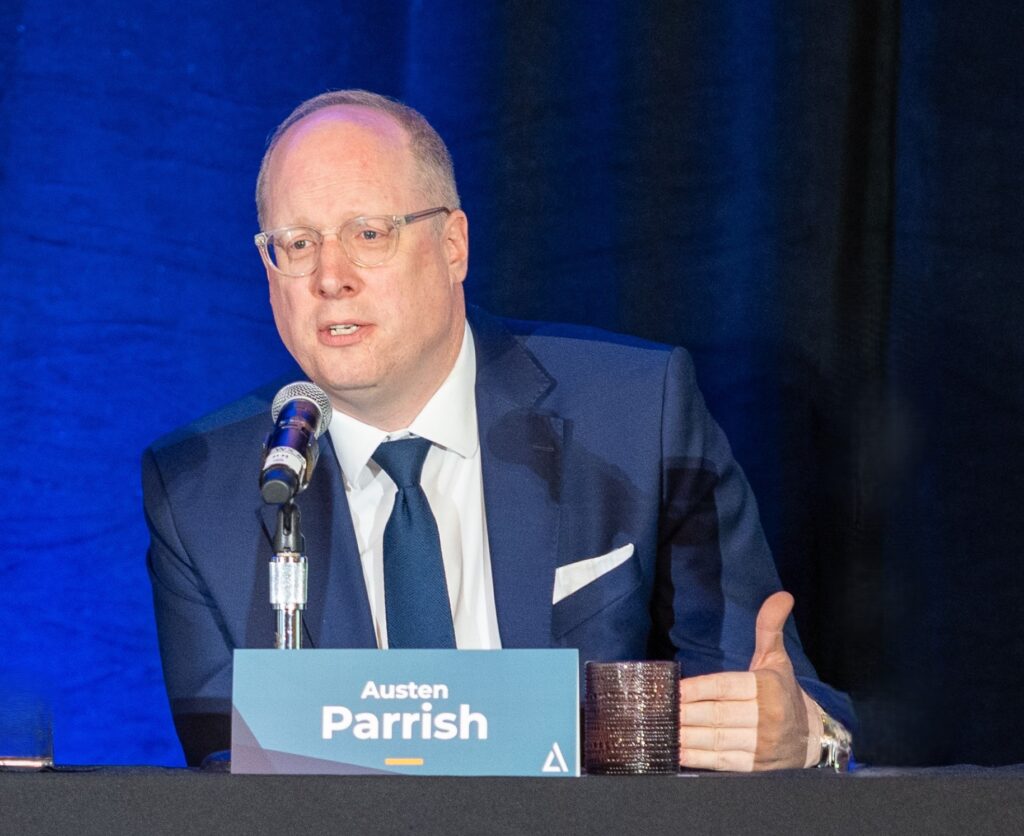By Austen Parrish, AALS President and Dean and Chancellor’s Professor of Law at University of California, Irvine School of Law

Dear friends,
It’s been quite a year for legal education. New federal student loan legislation will make it more difficult for students from lower-income families to afford law school, international students are finding it increasingly challenging to study in the United States, academic freedom is under attack, and universities are facing many other pressures. The Trump administration has targeted universities and proposed compacts. Political interference, from across the political spectrum at the state and federal levels, is widely viewed at an all-time high, while confidence in our universities among the public has ebbed.
Underlying the public discourse is troubling misinformation about, and a growing distrust around, higher education and its value. Yet most of the political rhetoric doesn’t reflect reality on the ground. Without losing sight of our collective commitment to continued improvement—and the importance of efforts to keep in check the cost of education—we also should not lose sight of the good we do. Law schools offer more than a professional credential for students; our schools play a vital role in our local communities and in our society.

In my presidential remarks from January, I highlighted some ways that legal education has evolved and adapted over the years. For this AALS LENS President’s Message, I felt I would underscore just a few of the ways legal and higher education make a difference to the students we educate and the communities we serve. As in other President’s Messages, I have included links to reports and studies, popular news articles, and to websites to hopefully make this a useful resource. I am not suggesting higher and legal education is an unallayed good that is perfectly suited for every person at every time. Yet, overall, universities and our law schools make a positive difference. Reducing access to higher education and weakening our universities will eliminate jobs, frustrate innovation, make the U.S. less competitive, reduce social mobility, and harm local communities.
I look forward to seeing you in New Orleans in January. This is an important time for us to be together, and I hope you’ll join me at the Annual Meeting.
Warmest wishes,
Austen Parrish
The Benefits of Higher and Legal Education
“[Universities] enable young people to explore their interests and passions and prepare for the world of work. They have also become the go-to institutions for research and the generation of ideas, and therefore they are engines for both economic growth and social mobility.”
- Personal and Professional Growth. Legal education has long provided a path to greater career stability, personal and professional growth, and social status.While law jobs are demanding and can be stressful, graduates report high levels of satisfaction and job stability. Legal education helps make our graduates adaptable and valuable across a multitude of sectors, and lawyers do well in other professions too. Law graduates are disproportionately represented in top leadership positions in business and in government—for example, approximately 10% of CEOs of large companies, one in three members of Congress, and almost half of U.S. Senators have law degrees. The critical thinking and other skills which legal education imparts is also valuable in other areas of life, from managing personal finances to navigating complex family or social issues. The National Association for Law Placement has reported record-high employment rates and salaries for recent law graduates, while jobs demanding higher-level skills like critical thinking, problem solving, creativity, and leadership are predicted to expand (with the U.S. facing a shortage).
- Increased Wages and Social Mobility. The differences in wages and lifetime earnings between those who only complete high school, those who attend college, and those who go on to graduate or professional schools has continued to grow. The financial benefits to a law degree are often substantial and while we see some disparities in outcomes, overall there’s significant value to legal education. The risk of unemployment or underemployment is less for those with more education, and college graduates (and law school graduates) are more likely to remain employed during economic downturns. College graduates and law school graduates are also more likely to have “higher-quality” jobs that offer paid vacation, better health insurance, retirement, and other benefits. Those graduating college are “3.5 times less likely to be impoverished and nearly five times less likely to be imprisoned.” The intergenerational transmission of wealth and educational attainment is also a well-established phenomenon. By providing a stronger financial foundation, graduates can better support their families, invest in their children’s futures, and contribute to the local economy through increased spending.
- Broad Health and Other Personal Advantages. Graduates benefit from higher education in ways beyond the financial. A recent 2025 study found that college graduates live an average of 11 years longer than those who did not finish high school (“Across more than 3,000 US counties, vast geographic differences with a widening gap were registered between the least and most educated, with a longer lifespan for those with a higher level of education.”) Those who attend university or graduate school tend to live healthier lives too. Studies show that college graduates “are significantly less likely to smoke, more likely to exercise regularly, and tend to have a better diet compared to those with less education.” Other reports note that “individuals with more education are less likely to report conditions such as heart disease, high blood pressure, diabetes, anxiety, and depression.”
“Overall, higher education can lead to improved health and well-being, as well as reduced risk for premature death. College graduates have better self-reported health than high school graduates, and individuals with more education are less likely to report conditions such as heart disease, high blood pressure, diabetes, anxiety, and depression. Furthermore, individuals with more education are more likely to exercise, drink less alcohol, and seek preventive health care when needed.”
– U.S. Department of Health and Human Services, Healthy People 2030
- A Driver of Economic Growth and Support for Local Communities. The economic boost that universities provide local communities is well understood; college towns tend to be economic drivers in their regions. Some of this is the businesses that serve students—restaurants, stores, local entertainment, and more—but it’s also that universities hire faculty, staff, and other employees so they are often one of the largest employers in a region. In this way, universities make “vital contributions to the economy as employers, investors, business incubators, and industry partners.” College and law school graduates are more likely to be engaged with their communities, volunteer, and help others. Law schools, with an emphasis on civics, also empower students to become engaged and informed citizens. Law schools, with the growth of clinics, pro bono programs, and externships, are sometimes among the larger providers of free legal services to the poor in their regions, are critical partners with local nonprofit and legal services organizations, and help with access to justice gaps. Studies have shown that universities, in places around the world, can revitalize the fortunes of regions, anchor growth and support sustainable futures. When colleges and schools close, local economies are harmed.
- World-Changing Innovations and Advancing Knowledge. Research universities develop innovative technologies, produce patents, foster the creation of startup companies, and produce entrepreneurs. And this is not to mention the important contributions around pathbreaking research, inventions, and knowledge generation that forms an important part of our missions and helps all Americans. University research has given rise to world-changing innovations in medicine, technology, and science—from life-saving gene therapies and public health protocols to the foundational science behind the internet, GPS, and artificial intelligence. Law schools also make major contributions through faculty research and scholarship, and help advance an American style of legal analysis and reasoning. Law schools and their faculty are “part of a broad infrastructure of ‘knowledge institutions’— universities, a free press, scientific offices (public and private), [and] libraries” while a “critical function of legal scholarship is to identify both what is working well and what is not working well in the legal system.”
- A Foundational Pillar to Democratic Society. Legal education and law schools serve as the bedrock for the rule of law and constitutional governance, a system that provides the stability and predictability necessary for economic growth and innovation. The rule of law itself is a prerequisite for economic stability and growth, and law schools play a critical role in setting the environment needed for economic success. Having students from other countries study at U.S. universities has helped U.S. strategic interests, enhanced bilateral ties, and has been useful for business as well as foreign policy and soft power. In short, law and legal education matter.
“The rule of law is the foundation for healthy communities of justice, opportunity, and peace.”
– William H. Neuko
Co-Founder & CEO, World Justice Project


